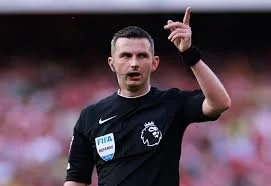Michael Oliver Left Out of Premier League Duties After Controversial FA Cup Decision
Top Premier League referee Michael Oliver has been noticeably left out of officiating duties for this weekend’s round of league matches, sparking discussions about his recent decision-making in the FA Cup.
Oliver last officiated the fifth-round FA Cup clash between Crystal Palace and Millwall, where he came under fire for failing to immediately stop play after Palace striker Jean-Philippe Mateta suffered a serious head injury. The forward was kicked in the head by Millwall goalkeeper Liam Roberts, leading to a gruesome ear injury that required 25 stitches.
Despite the severity of the challenge, Oliver initially failed to brandish a red card, only doing so after being prompted by VAR to review the incident on the pitchside monitor.
Keith Hackett Calls Out Oliver’s Judgment
Former Premier League referee and PGMOL (Professional Game Match Officials Limited) chief Keith Hackett did not hold back in his criticism of Oliver’s handling of the situation.
“What an appalling challenge, and I have to ask the question—why did one of the world’s top referees fail to immediately show a red card?
It is, frankly, an absolute no-brainer,” Hackett stated.
Oliver’s exclusion from Premier League action this weekend suggests that PGMOL may also have concerns about his decision-making in that match. While referees are often rotated for different competitions, being overlooked for top-flight games immediately after a controversial moment raises eyebrows.
A Worrying Trend in Officiating?
Oliver is regarded as one of the best referees in the world, frequently officiating high-profile matches, including Champions League fixtures. However, this incident highlights an ongoing debate about refereeing consistency and the use of VAR.
If a challenge as dangerous as Roberts’ required VAR intervention before a red card was issued, what does that say about the current state of decision-making on the pitch? Player safety should always be a top priority, and head injuries, in particular, demand immediate action.
Oliver’s omission from this weekend’s Premier League fixtures might be a silent acknowledgment that he got it wrong. Whether this signals a temporary setback or a deeper issue with officiating standards remains to be seen.
For now, the debate continues: should top referees be held more accountable for their mistakes, and is VAR truly helping or hindering the decision-making process?








